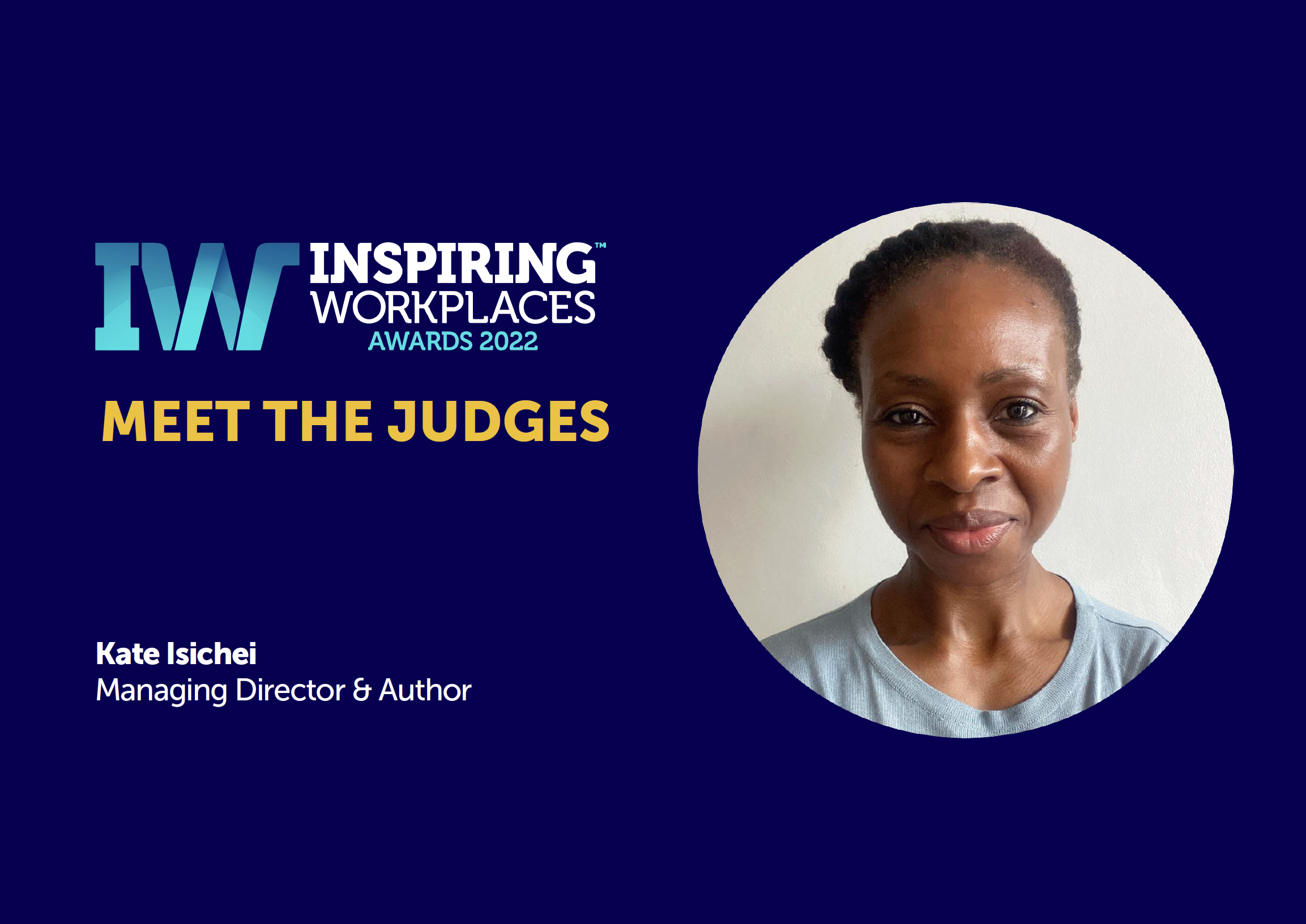
09th March 2022
Meet the judges 2022 – Kate Isichei

IW: Today, we’re delighted to be joined by one of our 2022 EMEA judges for the Inspiring Workplaces Awards. Welcome Kate Isichei.
Firstly, we wanted to ask you all, what does an Inspiring Workplace mean to you?
KI: A workplace that promotes psychological safety and encourages employees to have honest and transparent conversations about aspects of the business that are challenging as well as what they find enjoyable and fulfilling. An environment that is clean and promotes mindfulness as well as being considerate of others’ feelings. Somewhere that physically looks great is also quite high on my agenda.
IW: You’re a judge for the EMEA/ North American Inspiring Workplaces Awards. What do you hope to see in the entries?
KI: Workplaces that are inspirational and engaging and have created an environment that promotes employee wellbeing and mental health. I would also love to see some thoughtful physical spaces that have used space, colour, light and textures in interesting and innovative ways.
IW: What are three areas of focus for organizations looking to improve the people experience?
KI:
- Employer Brand or EVP
- People Manager Enablement
- Authentic Leadership
IW: What do you think is the most important quality in a leader?
KI: Empathy. The ability to consider how others are feeling and put yourself in their shoes.
IW: What’s the best advice you were ever given? Who was it from?
KI: It’s not very nice but it was apt at the time – the mid-90s when presenteeism was a big thing in the workplace. He said ‘You have to play the game. I don’t want to be here either but I smile and pretend’. It sounds awful now but it was good advice for the environment I was in at the time which required nerves of steel.
IW: What’s your advice on how best to engage remote teams?
KI: Provide space for exploration of feelings and emotions outside of the daily tasks and work challenges. Not just ‘how are you?’ conversations but an opportunity to talk about the remaining 50% of employees’ lives that are outside of work.
IW: Following on from that question, how do you build a strong inclusive culture with a hybrid workforce?
KI: Create spaces for people that suit them. We all have different ways of learning and developing. Even the most basic things are done differently. It is becoming more and more apparent that people are vastly different. When we add on neurodiversity it becomes even more important to curate different channels and environments – both physical and virtual – that suit a wide range of personalities and personal requirements.
IW: Focusing on employee emotional wellbeing, how do we help employees create boundaries between work and home life?
KI: Encourage cut offs throughout the day like definite breaks and a proper lunch that is booked into calendars and that are not an excuse for others’ to ignore or gate crash with more meetings. I have found that it’s even more important to move away from the desk and computer than it was when working in the office every day. I have seen some companies use statements in their email signatures that discourage responding to emails if they are received outside of traditional office hours.
IW: 4-Day week – Yes or No? You can give reasons for your answer to if you wish.
KI: Yes. 5 days is too long to work continuously and most people do already work a 4 day week informally. Fridays are typically very quiet because employees make a conscious decision not to schedule meetings in the afternoon and log off by 5pm.
IW: We are a big believer that fostering psychological safety is an organisational imperative. Do you agree and if so, why?
KI: Yes, I mentioned this above. It’s crucial for employee wellbeing and engagement. If employees feel safe to express themselves, an organisation is more likely to foster a healthy environment that is less political and less hierarchical. Both the scourge of underperforming companies.
IW: Hopefully, we are seeing the restrictions of the pandemic diminish. This has led to what some are calling ‘The Great Resignation, what do employers need to do to ensure they attract and retain the best people?
KI: Be flexible and receptive to suggestions and proposals that might not seem at first to be advantageous for the company. There’s no point digging your heals in and doing things the same old way if it isn’t working for the new ways of working. Employees, particularly newcomers to the workplace, are more demanding and know what they want. In addition, they are less likely to take ‘no’ for an answer.
IW: There will be more generations in the workplace than ever before. Each with its own expectations and needs from an employer. How do you try to fulfil all of them?
KI: You can’t really. One size doesn’t fit all but what you can do is keep track of trends and try to ensure your organisational environment, culture, values and behaviours are true to the company’s vision and mission but also aligned with the times.
IW: To say we’ve seen a lot of change in the past two years would be an understatement. We want you to get your crystal ball out and predict what will be the top priorities for people choosing an employer over the next 5 years?
KI:
- Flexibility
- Authentic leaders
- Hybrid environments – office spaces that mirror homeworking
- Remote working as normal
- Employees as co-creators/partners

